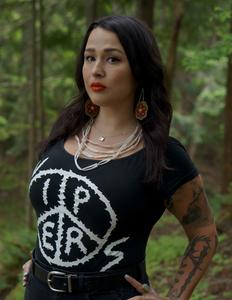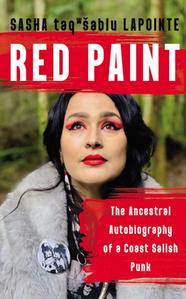
|
|
| photo: Blaine Slingerland | |
Sasha taqʷšəblu LaPointe is a Coast Salish author and songwriter from the Nooksack and Upper Skagit Indian tribes. She received a double MFA in creative nonfiction and poetry from the Institute of American Indian Arts and lives in Tacoma, Wash. Red Paint: The Ancestral Autobiography of a Coast Salish Punk (Counterpoint, $23; reviewed below) is her debut memoir.
You bookend Red Paint with lyrics, starting with the Salmon Song translated by Aunt Susie, and ending with lyrics of your own. You also begin not with I but we: "We were a hunter-gatherer society. We were nomadic." How did you approach the telling of these stories?
I knew I wanted to begin this story in the words of my great-grandmother and my ancestor Aunt Susie. So much of what I learned on my journey of finding strength and healing came from these women, especially my grandmother, Aunt Susie and Comptia Koholowish. This was my way of honoring all they've taught me. Using the We is something I've shied away from in the past. I often struggle with the idea of writing from a collective we, because sometimes I think it can come across as presumptuous or entitled. It was important for me to begin with the We to signal to the reader this is not my story alone. This book isn't just about me, but rather a story of the women who came before me and all that they taught me. I hoped that right away the reader would pick up on that because of how I chose to structure it.
There's a striking line early in Red Paint: "It's easier to remember the hard things." How do you access the easier things, the positives that also shine through--either in terms of recalling memory, or in, say, physical practices like reviewing old journals and photos, visiting?
I think that line carried so much weight for me. This idea that we hang on to trauma and focus on it because sometimes it can eclipse the strength and the moments [when] we do have power, or safety, or happiness, is something I've had to fight against. In my previous manuscript Little Boats, I couldn't get away from the pain and the anger. I think the book read as a sort of sad catalog of every hard thing that had happened to me, and there was no power in it, no healing. I think this line is a nod to that, a way to remind myself not to focus on only the hard things, but to work to move through them.
There are so many moments of kindness in Red Paint. What are some kindnesses you experienced from others, and maybe even granted yourself, in writing it?
I love this question because those moments of kindness and softness really helped to prop me up against the heavier, more weighted moments. There is a lot of darkness in this story. And I think there was a lot of strength and love and understanding from so many people around me while I was writing. Letters and care packages from friends and family, very long FaceTime calls with one of my best friends (thank you, Tania) and just a lot of patience from the people in my life. And I think in the process of writing this I learned a lot about being kind and compassionate towards myself and through that was able to be kinder and more compassionate to those I loved.
 A physical object that holds great resonance are the dentalium shell earrings from your friend Tania, which she says: "We wear... to show how much we are loved." Did Red Paint feel like a celebration of love?
A physical object that holds great resonance are the dentalium shell earrings from your friend Tania, which she says: "We wear... to show how much we are loved." Did Red Paint feel like a celebration of love?
Her work is stunning. And yes, receiving those earrings and the note she sent about "We wear them to show we are loved" was literally one of those eye-opening moments. There was such wisdom there! And I think of it all the time, still. I think when I was wrestling with different notions of love, what it meant to be loved, or to love someone, I was struggling with the attachment part of love, the part of love that maybe didn't work for me in failed relationships. I think receiving Tania's gift at the time that I did was the exact time I needed to hear it. Because it taught me that I don't need to love someone else, to bend myself into fitting into their idea of love or their idea of me, but rather understand that I had enough love, I had the tools to love myself. And that was the love that mattered the most.
Any questions you are particularly excited about with the book's release, or particularly dreading?
I'm excited about food and music and movie questions. I'm excited about fun questions. Because if you read Red Paint carefully, you'll understand just how important those things are to me. I'm silly. I'm a total nerd. I get really excited about talking about whatever I happen to be obsessed with currently. I'll take the light questions and the goofy questions when I can.
I think I'm dreading questions about kids. Like, a couple people have asked me if I'd try to have a kid again and I'm like, I have no idea and that's also none of your business. If that's what you walked away wondering after reading, I think you read wrong. I also think there's this assumption or expectation that most women want or crave motherhood. I have no idea if I want to do that, not really? It was a very specific time in my life, connected to a certain person and a certain love. I think it's rude to assume most women want that. Some of us don't. Some of us have no idea. And that's fine.
Any interesting writing process snacks or habits?
Thank you for this question! I'm an incredibly snack-motivated person, and I like snack questions. And I have a bit of a sweet tooth. I'd like to answer with something more writerly, whatever that means, and answer really poetically like, I eat half a pomegranate and drink Douglas fir tip tea or something when I write. But I literally have a bag of Sour Patch Kids in front of me. It's one of my favorite bad snacks. My partner calls them "Sour Patch Children" and that cracks me up. Lots of coffee. Lots of vegan gummies. I'm the pillar of health.
Who do you most hope reads Red Paint?
I hope people who haven't had the chance to see themselves reflected back at them on the page read it. Growing up it was difficult to find any experiences that reflected my own as an indigenous person, a Coast Salish person, a mixed heritage person, a queer person, a person who survived sexual assault or grew up on a reservation. I didn't see many indigenous stories on the page or on the screen and that often felt lonely. The books, the films and the music I loved were almost always through the lens of only whiteness. I know that it's changing, and I'm so excited for that. I'm so excited to see film and television, books of prose and poetry from native voices. And I hope my book can be part of that.
I hope other Coast Salish people read it, but I also hope nonnative people who don't know a lot about Coast Salish people read it.
What have you read lately that you love?
Sharks in the Time of Saviors by Kawai Strong Washburn. It is one of the most incredible books I've ever read. I am actually rereading it now. It's such a beautifully powerful story, one that is unapologetically indigenous. One that more white people (especially white people who live in Hawaii or even travel to Hawaii) need to read. He is such a capable and poetic storyteller that I can't put it down. I'm actually ending this interview right now so I can keep reading. --Katie Weed

